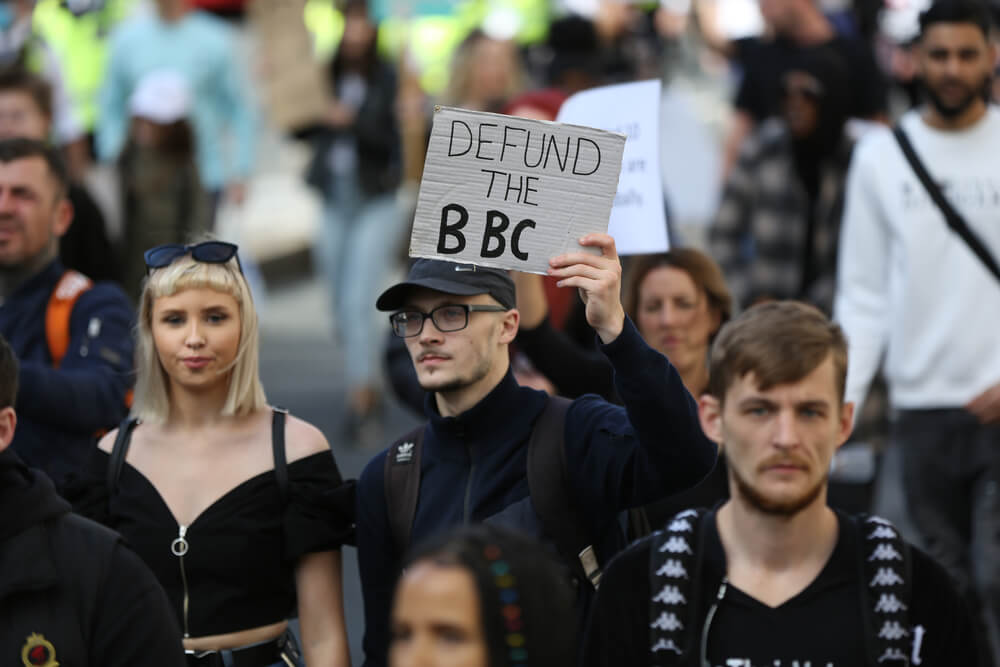A comforting conceit shared within the much-maligned mainstream media is that, if everyone is criticising them, then they must be doing something right.
This defensive pride in reporting the uncomfortable truths of current events “without fear or favour” is nowhere stronger than at the BBC, a model of independent public service broadcasting since its foundation in 1927.
For almost a century, its reporters and editors have been accustomed to fending off pressure from interested parties, including politicians, who might prefer a national broadcaster that better reflects their own varnished versions of the truth.
In today’s shrill and fractured media environment, the BBC’s impartiality is increasingly challenged from the left and the right, while its role as principal news-provider to the nation is increasingly in question at a time of mounting costs.
The licence fee
Spending pressures this month forced the broadcaster to announce a plan to scale back some of its flagship news programmes, while the government has hinted at limiting a promised increase in the licence fee paid by viewers and listeners that keeps the BBC afloat.
The Conservative government’s culture secretary, Lucy Frazer, citing cost of living pressures, said this week that a potential £15 increase in the £159 a year fee would "absolutely" be too much. Her comments to a BBC interviewer came after reports the government plans to use a more modest indicator of inflation to peg next April’s increase to around £10.
Prime minister Rishi Sunak previously issued a veiled warning that the BBC should “cut its cloth appropriately” when it came to organising its budget.
Whatever increase the government eventually authorises, it will come after two years in which the fee was frozen at a time of ever mounting costs.
The spending squeeze has revived a debate over whether the licence fee model, which amounts to a single-rate tax on all households, is still valid and, if not, what might replace it.
When the British Broadcasting Corporation was originally established with a mission to “inform, educate and entertain” it enjoyed a domestic monopoly in radio broadcasting which was subsequently extended to television.
When it comes to news output, the BBC has little option in straightened times but to rely on spending cuts
Since those monopolies ended - in 1955 in the case of TV, in 1973 for radio - the BBC has held its own as a provider of quality programming, from the high-brow to the hilarious.
In the face of more recent competition from streaming services, it has managed to stay in the game by commercialising its drama and entertainment output.
When it comes to news output, however, the BBC has little option in straightened times but to rely on spending cuts to balance a historically declining licence fee budget.
It is in that context that the broadcaster unveiled a £500 million savings plan that will involve a major shakeup of its news programming. The headline element was the decision to trim the running time of the flagship Newsnight programme by a third and to transform it into a 30-minute interview, debate and discussion show.
Deborah Turness, the BBC’s chief executive of news and current affairs, tried to put a positive gloss on the changes when she said: “Like many businesses, we are in a tough financial climate and, as our audiences shift rapidly from TV to online news consumption, we need to make choices about where we allocate our resources.”
What she failed to spell out was that on-the-spot reporting and investigation are expensive, while talking heads in a studio are cheap.
The BBC's funding dilemma
Like other traditional media, the BBC has had to adapt to an online media environment in which younger generations of consumers assume the news comes for free.
That may a factor in a growing number of people opting out of paying the licence fee, with sales down by 420,000 last year to just over 24 million. Avoidance, up from 5 to 10 per cent in a decade, is technically an offense for anyone who watches TV, whether from the BBC or commercial providers.
There is no easy solution to the licence fee conundrum. Those who value the BBC, and that must logically include the majority who rely on it as their main news provider, might think that a weekly £3 or so is a fair price to pay.
 To maintain its extensive network of correspondents at home and abroad, even £5 a week would sound reasonable. But no government is going to give the nod to that
To maintain its extensive network of correspondents at home and abroad, even £5 a week would sound reasonable. But no government is going to give the nod to that
To maintain its extensive network of correspondents at home and abroad, as well as to revive its dwindling local news services even £5 a week would sound reasonable. But no government is going to give the nod to that.
At the moment, every household, whether rich, poor or in-between, pays the same fee. One option might be a sliding scale of charges based on taxable income.
An alternative might be to anonymously track cross-platform usage, so that consumers only pay for those BBC services they directly access.
There is no short cut though to solving the BBC’s funding dilemma. In the broadcaster’s favour, it continues to enjoy a high level of trust among a public who believe it is an institution worth preserving.
But the news doesn’t come cheap. Like so much else in life, you get what you pay for.